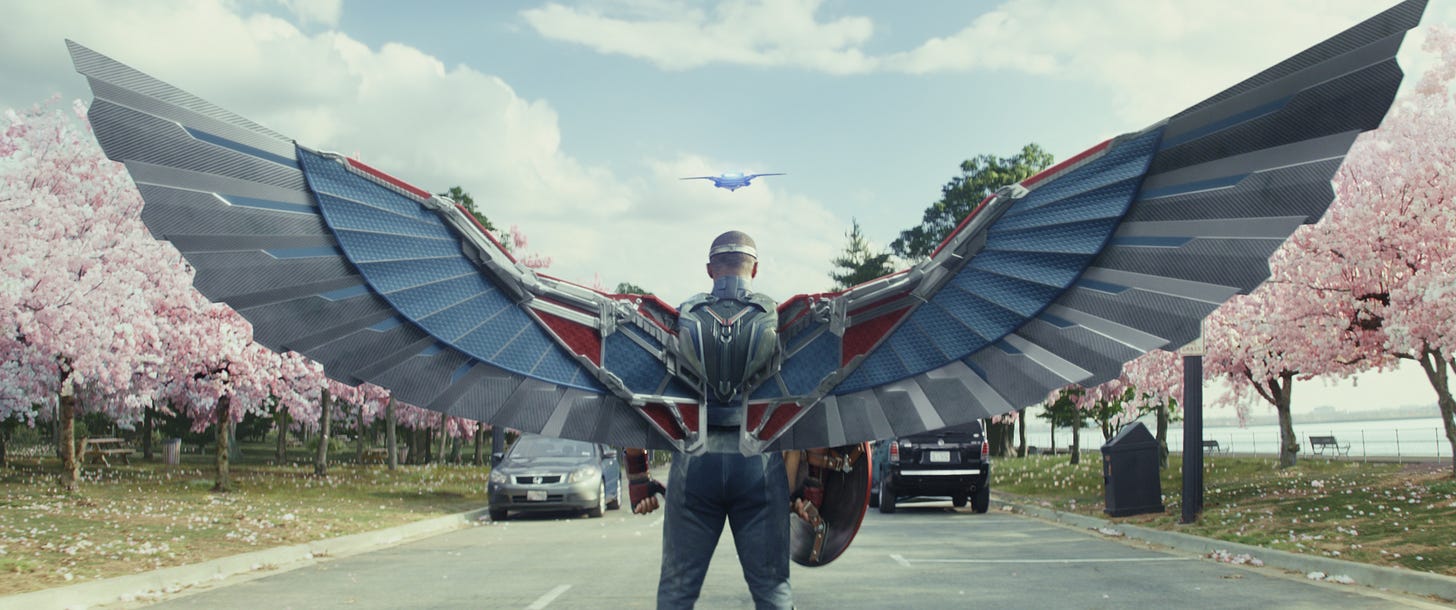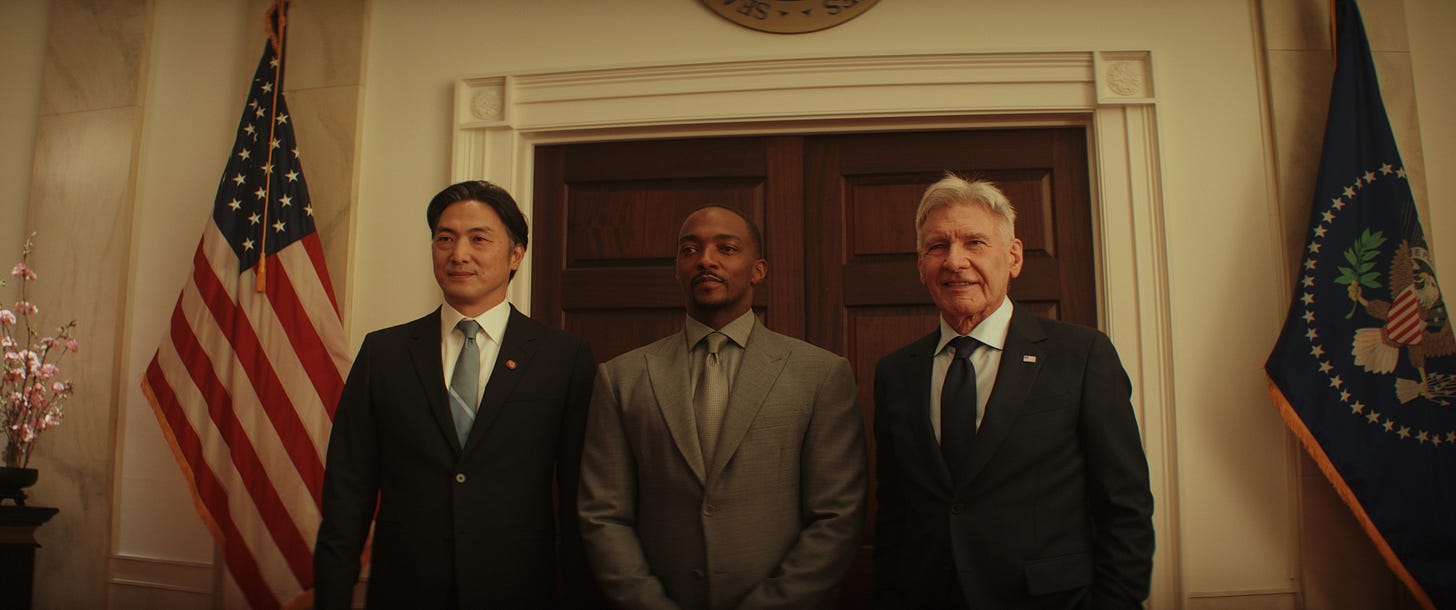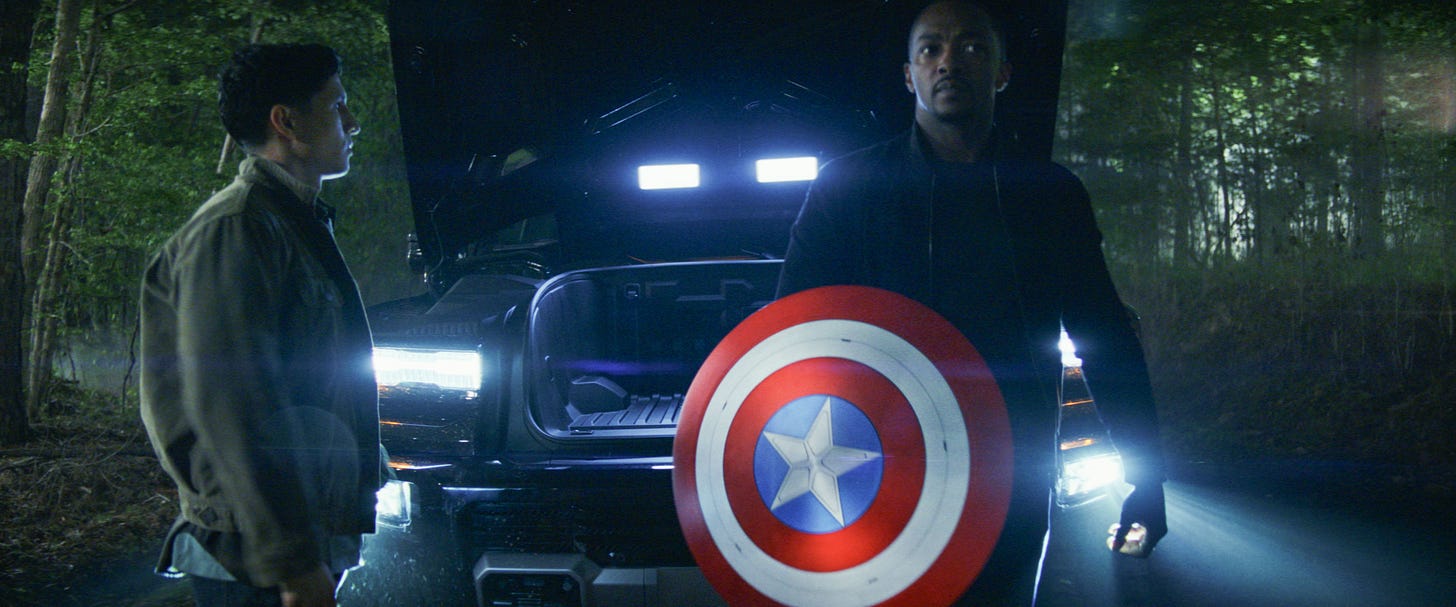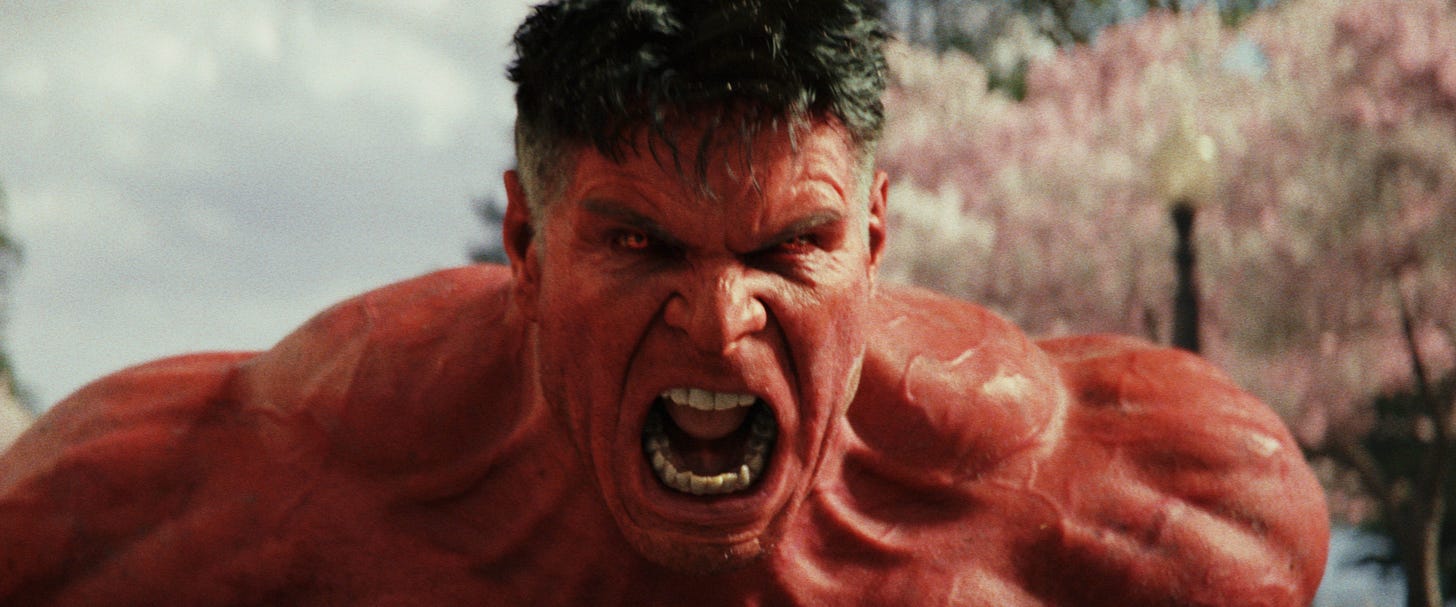Captain America can do this all day, but i sure can't
a red hulk can't save this red, white, and blue snooze-fest
Marvel has always marketed its Captain America movies as the thinking person's portion of the MCU. In practice, that’s been little more than a savvy marketing play. While previous entries like Captain America: Winter Soldier and Captain America: Civil War have worn the veneer of social commentary, purportedly grappling with ideas like American exceptionalism and the limits of blind service to country, they have always been terrified of giving the audience anything to chew on after exiting the theater. You'll never leave a Cap movie thinking about the consequences of American imperialism; you'll be too busy talking about the climactic fight scene.
Captain America: Brave New World lands at a strange time for the franchise—the MCU as a whole and the Cap series in particular. The former is struggling to climb out of a creative tailspin already likely to happen after the sugar high of 2019's Avengers: Endgame and made inevitable by an ill-timed global pandemic. The latter is saddled with a new face carrying the mantle of the Star-Spangled Man in the form of Anthony Mackie, who has until now been sidelined. No wonder this film is centered around characters who feel they have something to prove. Unfortunately, I left the theater unconvinced.
I unfailingly attend MCU movies on opening night. On a Thursday evening, in a Dolby or IMAX theater that costs extra for the privilege of enhanced immersion, you find yourself surrounded by the most dedicated fans. These films are often derisively compared to amusement park rides. The comparison is apt, and that's why I enjoy them so much. Rising to our collective feet and cheering as Captain America raised Thor's hammer in Endgame is one of my favorite moviegoing experiences, in part because of how empty it was of caloric intellectual value. Film is so often a heady medium, so it's nice to occasionally have something that bypasses the brain for the gut.
It is therefore a cruel indictment of the franchise that when, at the conclusion of Brave New World, a single man shouted out, "That was sick as hell!" he was met not with cheers but with hushed, pitiable chuckles. We all recognize a fan trying to convince himself that what he just saw wasn't a train wreck. During the film's 118-minute runtime, there was nary a cheer to be had. The only crowd reaction came about halfway through, when the villain who has been shrouded in darkness for the first half of the movie flicks on a light to reveal himself. This is Tim Blake Nelson as Samuel Sterns, a man whose exposure to gamma radiation has enlarged his brain such that it protrudes into his skull. The reveal of his disfigurement is clearly intended to be chilling but is so mishandled that it comes across as comical. The crowd laughed in shared embarrassment.
Sterns is as good a place as any to dig into what went wrong here. Without spoiling much, he's been kept at a black site prison by president Thaddeus Ross (a game Harrison Ford doing what he can to make you feel like you're watching a real movie and not a regurgitated pile of slop), so now he's plotting to make the commander-in-chief transform into a Hulk as a way of discrediting him on the international stage. The Hulk part is supposed to be a big twist, but since Disney advertised it in every trailer for this thing, it can hardly be counted as such. Well, okay, there are MCU villains with far less motivation scattered across the franchise. Except, unlike most of them, Sterns doesn't feel like a real threat at any point. Moreover, he's not even out to get Captain America. His sights are set on the president, and Sam Wilson is merely an annoying obstacle.
When the two do interact, Sterns is reduced to shouting play-by-numbers action villain dialogue. He meanders through monologues about how Wilson has been an unexpected variable in his master plan or why they should see eye to eye. But he spends most of his time nasally threatening president Ross over the phone, archly declaring his revenge and blandly inviting him to "give in to the monster within.”
For his part, Harrison's Ross is both the movie's most idiotic construct and its saving grace. When Ford appears on screen, Brave New World feels like a capital-M Movie, and you're instantly reminded why this man is the defining star of the late 20th century. When the focus shifts from him, the movie sputters and struggles to keep its wind. (This has nothing to do with Mackie, a remarkable talent who would make a fantastic Cap if he wasn't being wasted as a mouthpiece for American imperialist apologia, but more on that later.) The movie seems to recognize this, which is probably why Ross gets almost as much screen time as Wilson.
Over a page into this commentary, we can finally talk about the odious elements at the core of this rotten movie. Let's start by noting that it centers around an innocent Black man on death row, which is of course a direct allusion to such occurrences in our own reality, most recently the murder of Marcellus Williams. Isaiah Bradley (a superb Carl Lumbly), the Black super-soldier first introduced in 2021's Disney+ miniseries The Falcon and the Winter Soldier, finds himself facing down a death sentence for attempting to kill the president, and Wilson's mission is born of a need to exonerate him before the execution. Mackie's Cap has been centered from the beginning around the paradox of a Black man acting as the avatar of a nation that hates him, so this setup seems at first glance like fertile ground to further explore those themes. Sadly, this is a movie too chickenshit to say literally fucking anything about anything, so what we get is, at best, the impending execution of a Black man used as a cheap ticking clock. At worst, you could interpret it as hand-waving away the state-sanctioned murders of Black people in real life who don't have a Captain America to save them, but I find it hard to believe anyone who worked on this thing gave it that much thought.
Which brings us to the America of it all, and the best way to discuss that is to first consider the Israel of it all. Joining the MCU is Ruth Bat-Saraf, the Israeli hero better known as Sabra in the comics. She's played here by Shira Haas (Unorthodox, Shtisel), whose acting is lackluster and whose casting remains problematic. Bat-Saraf appears here as the president's personal security advisor, an uncomfortable reminder that Israel is at its core a territory of the United States. But lest the Zionists start to sweat, I'll assuage their fears right now: Brave New World is as utterly uninterested in commenting on the American-Israeli partnership as it is on anything else.
There is a black hole at the center of this movie, and it is most pronounced when Bat-Saraf is punching up baddies alongside the literal avatar of America. What the film tells us about her is that she was born in Israel and trained in the Red Room as a Black Widow. It is my sense that a lot of her material was cut. At times, she enters a room and says hello, only to exit a few moments later. One imagines an earlier version of this movie in which she was, as in the comics, openly ex-Mossad.
This leaves Brave New World in the laughable position of pissing off both Zionists and anti-Zionists alike, the former upset that anything identifiably Israeli has been scrubbed from the character aside from her accent while the latter protests her inclusion in the film at all. As you might imagine if you know anything about me, I fall into the latter camp. But it's hard to be truly mad when even a character representing an ongoing genocide can't shake the movie out of its stupor. At base, Haas is tasked with walking around saying cartoonishly serious things into earpieces, doing a few martial arts moves, and then waltzing off into the sunset.
I've said a few times now that this film has nothing to say, but that's not entirely true. It beats the audience over the head with one single concept: America can never be in the wrong. We start with a Black man on death row. We then find out that the president has been hiding dark secrets about the country and his own past, including the operation of illegal torture sites for his own personal gain. He badly mishandles a crucial treaty with what appears to be a random assortment of nations (why would France, India, and Japan be the other powers vying to gain control of newly discovered adamantium deposits in the middle of the Indian ocean, and for that matter, why would America have dibs on it, either?), then transforms into a rampaging, red Hulk that tears up the White House. It seems like perhaps a superhero-coded commentary on the January 6 insurrection… until Ross voluntarily turns himself in and accepts a prison sentence.
This movie wants to be about politics in the same way a child playing house wants to be a mommy. Its plot hammers home that the president is always to be respected, even when he's wrong; that when he acts honorably, he reflects America's honor, but when he causes damage, it's his personal failing and not a reflection of the nation; that when America acts aggressively, it is because of nefarious, subversive elements working to undermine our truly righteous nature. This sort of rah-rah patriotic pablum isn't exactly new ground for action movies or the MCU, but executed this poorly, it shows its hand. If you're looking for American circlejerk propaganda to swell you with national pride, skip this and go rewatch "Top Gun: Maverick."
—M







